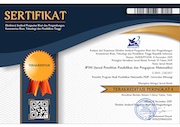Penggunaan assessment for learning (AFL) melalui peer assessment untuk meningkatkan mathematical problem solving
Abstract
The aim of the study to examine differences upgrade in mathematical problem solving of students in Calculus 1 Course after getting learning Assessment For Learning Through Peer Assessment. Two classes selected by cluster random sampling, the class I-C selected as an experimental class and class I-B as the control class. The study uses a method mix. Based on data analysis, by using assessment for learning through peer assessment, the students had the mathematical problem-solving abilities better than students who do not use it. Also based on the quality normalized gain, analysis represents the improvement of mathematical problem solving for students who receive peer learning through better assessment than students who did not get it. The students were able to conduct discussions properly, take feedback in questions, comments and objections for the teaching materials and worksheets and also were able to assess they friend tasking result properly through peer assessment.
References
Balan, A. (2012). Assessment for Learning A case Study in Mathematics Education. Disertasi. Universitas Malmo. Malmo : Tidak diterbitkan.
Brooks, T and Cole (2007) Principles Of Problem Solving. [Online]. Tersedia : http://www.stewartcalculus.com/data/ESSENTIAL_CALCULUS/upfiles/topics/ess_at_01_pps_stu.pdf [27 Desember 2013]
Hake, R.R. (1999) Analyzing Change/Gain Scores. [Online]. Tersedia : http://www.physics.indiana.edu/~Sdi/Analyzingchange-gain.pdf. [26 April 2014]
Kartinah (2012). Assessment For Learning (Afl) Untuk Meningkatkan Kemampuan Pemecahan Masalah Pendidikan Matematika FPMIPA IKIP PGRI Semarang Pada Mata Kuliah Kalkulus II. Jurnal IKIP PGRI Semarang. Semarang : Tidak diterbitkan.
Kaur, B. et al. (2009). Mathematical Problem Solving Yearbook 2009, Association of Mathematics Educator. World Scientific Publishing Co. Ptc. Ltd.
Larson, L.C. (1983). Problem-Solving Through Problems with 104 Illustrations. New York : Springer-Verlag New York Inc.
Majdoddin, K. (2010). Peer Assessment : An alternative to traditionaltesting. Jurnal.Tehran : 396-405
Mugisha, S. (2012). An Investigation Into Problem Solving Skills In Calculus : The Case of Unisa First Year Students. Disertasi.University Of South Africa. Afrika Selatan : Tidak diterbitkan.
Polya, G. (1973). How To Solve It : A New Aspect of Mathematical Method. New Jersey : Princenton University Press.
Pujiadi (2008). Pengaruh Model Pembelajaran Matematika Creative Problem Solving (CPS) Berbantuan CD Interaktif Terhadap Kemampuan Pemecahan Masalah Pada Siswa SMA Kelas X. Tesis. Program Pasca Sarjana UNNES. Semarang : Tidak diterbitkan.
Sugiyono. (2012). Metode Penelitian Kuantitatif, Kualitatif dan R&D. Bandung : Alfabeta.
Trianto. (2007). Model-model Pembelajaran Inovatif Berorientasi Konstruktivistik. Jakarta : Prestasi Pustaka Publisher.
Van De Walle, J.A. (2008). Pengembangan Pengajaran Matematika Sekolah Dasar dan Menengah Jilid 1 Edisi Keenam. Jakarta : Erlangga.
White, E. (2009). Student Perspectives of Peer Assessment for Learning in a Public Speaking Course. Asian EFL Journal-Profesional Teaching Articles. Vol. 33.
DOI: https://doi.org/10.37058/jp3m.v2i2.160
Refbacks
- There are currently no refbacks.
©2017 JP3M (Jurnal Penelitian Pendidikan dan Pengajaran Matematika)
Program Studi Pendidikan Matematika
Fakultas Keguruan dan Ilmu PendidikanÂ
Universitas Siliwangi
Jl. Siliwangi No. 24 Kota Tasikmalaya - 46115
email: jp3m@unsil.ac.id
e-ISSN: 2581-2807 ; p-ISSN: 2460-8599

This work is licensed under a Creative Commons Attribution-NonCommercial-ShareAlike 4.0 International License.
StatCounter:
Detail


